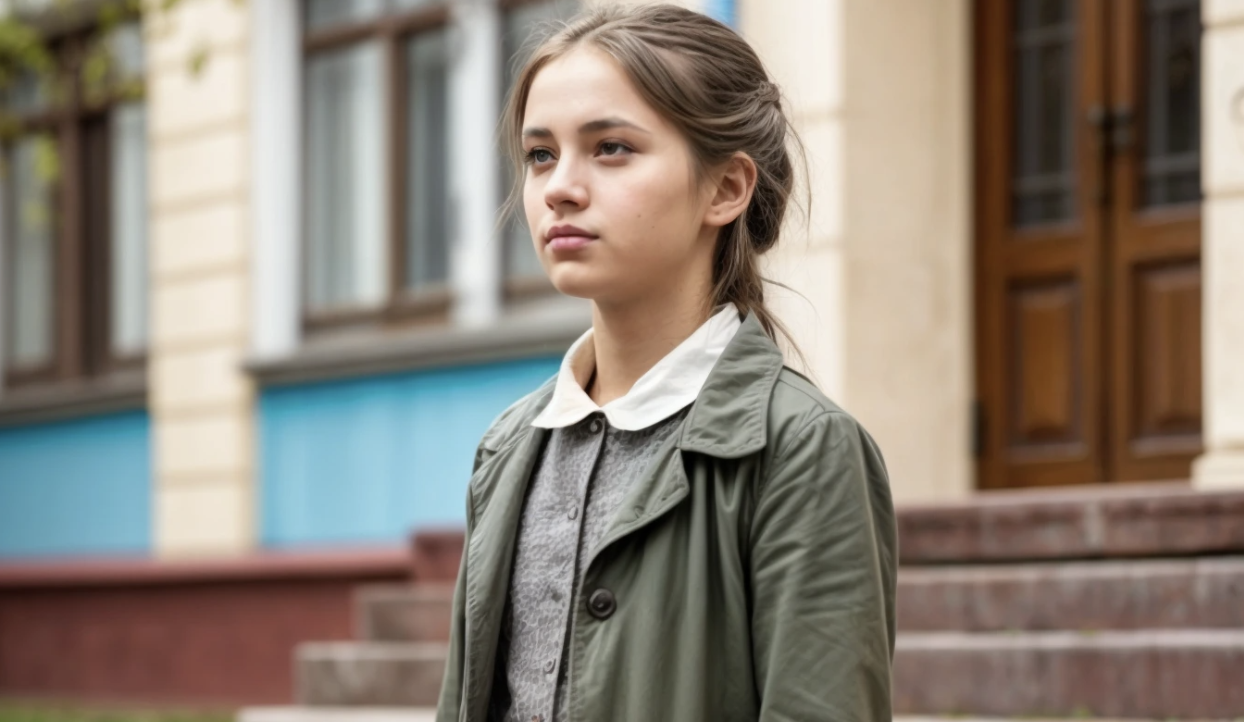Marina, sitting on the wide windowsill, gazed thoughtfully into the distance, where behind the gray rooftops the sunset hid, tinted with dull shades of melancholy. Thoughts swirled in her head like a whirlwind, giving her no peace. School was almost over — inevitable, just like what would come after: something uncertain, hazy, like smoke that you cannot grasp. What to do next? Where to go? Who waited for her beyond the threshold of adulthood? No one. Questions buzzed like annoying flies, but there were no answers. Going to study further was a dream that would remain just a dream. There was no money, and none was expected. Not a penny. Her father, once a respected worker, was now only a shadow of a man, spending his days in oblivion, escaping into the bottle as if into another reality. Her mother, disabled, whose hands trembled not only from pain but from constant alcohol, worked as a cleaner in some office. But the salary was so meager that it was barely enough to make ends meet. And if you added drinking to that, life became sheer survival. And then Marina hated them both — especially her mother, because she had expected more from her. But instead of strength and support, she got only emptiness.
Yet despite the hatred, pity flickered inside. Because once they had been different. Everything changed when perestroika came, breaking traditions, taking away jobs and hopes. Her father, honest and principled, was fired from the factory because he refused to turn a blind eye to defective products. Her mother worked at a factory until one day they discovered the enterprise was closed and the salary was only a promise. Since then, their life turned into a constant slide downhill, with each day worse than the last.
Marina no longer remembered when she last received something new. A new thing. A new chance. Her parents couldn’t adapt to the changes, didn’t see the tide of change, didn’t keep up with the times. And in her class, almost all the kids were children of those who managed to “fit into the era.” They had money, confidence, beautiful dresses, and expensive phones. And Marina had only dreams that crashed against harsh reality.
“Marin, are you bored?” came a voice, and she looked up. It was Valera, her classmate. The only one who didn’t judge by clothes or measure by wallet. He was different. Genuine.
“Just sitting here, waiting for the class hour. They’ll probably talk about the prom,” she answered, trying to keep her voice steady.
“Then I’ll wait too,” he said, sitting down beside her. “I was going home already, but since you’re here, I’ll wait.”
Marina smiled, and at that moment she felt a little lighter.
“You really are always like this! Aren’t you curious how the prom will go? It’s your celebration, Valera! The only one in life!”
“Not really. I care more about getting my diploma and forgetting this school. Don’t you see this isn’t a school anymore? It’s some kind of parody.”
“You’re too harsh. We’re still kids, Valera. We should dream, rejoice, believe. Don’t you want that?”
“Maybe I do,” he smiled, looking at her. “Then the first dance is mine.”
“All of them!” she laughed, feeling her heart beat faster.
When the teacher entered the classroom, Marina listened carefully as the program for the celebration was outlined. The thought that this might be her last school day filled her with trembling excitement. She dreamed of being part of this celebration. But when assignments were distributed, she waited to be given something to do. And waited in vain.
“Maria Semenovna, what am I supposed to do?” she asked, trying to sound confident.
“How should I know?” snorted the teacher. “You’re not going to come, are you? The event costs money. People chip in, buy dresses, order a banquet. Someone like you doesn’t belong there. You can pick up your diploma early.”
The words hit her like a slap. Marina felt her face flush with shame. Her ears rang, voices around her merged into a distant hum. She jumped up and ran out of the classroom. Valera followed her.
“Sevastianov, where are you going? You’re supposed to get a medal!” the teacher exclaimed.
“Screw your program,” he answered calmly and walked away.
Maria Semenovna paled. After all, it was Valera’s father who financed the prom. Without him, the celebration would collapse like a house of cards.
“Come back immediately!” she shouted, but Valera was already gone.
He found Marina in the hallway.
“How did you know where I was?”
They were silent for a long time, then she said:
“I’m leaving. I’ll take my diploma and leave. Don’t know where. Find a job. Maybe later study part-time. But I won’t stay here anymore.”
Valera sighed:
“Can I come with you?”
“And why do you need that?”
At home, the usual scene awaited her. Mother and father sat at the table, bottles in front of them. Marina stopped in the doorway.
“Listen, aren’t you tired of living like this? Drinking at every chance, just waiting for another day to pass?” her voice trembled with pain and anger.
“What? What death? Don’t like how we live? Wanted something else? Then go, try it yourself. Half of the people live like this!”
“Then why aren’t you in the other half? How much money do you spend on vodka? You don’t even realize how much they humiliate me at school. I wasn’t allowed to go to the prom because I’m a homeless girl!”
She ran out of the kitchen, grabbed her bag, and realized—there was nothing to pack. No things. No life. Only a toothbrush and pain. She fell onto the couch and burst into tears.
After a while, someone sat beside her. It was her father. He stared at one spot as if seeing through walls.
“You’re right, daughter. Completely right. I’ve been weak. I understand. But that just makes me want to forget everything even more. Leave if you can. Leave here.”
Marina sat at the edge of the couch, unable to utter a word. Her father handed her a worn bundle of papers — neatly tied with a rubber band, inside which lay money. Not new, not shiny, but real and heavy to the touch.
“Anywhere will be better for me than here,” she finally said, voice full of pain and determination.
“I know what you want to say,” he answered quietly, not looking at her. “But I can’t quit drinking. Not yet. Maybe later… someday. Here, take this. I saved it from those times. Even when I had nothing to sober up with, I didn’t touch it. This will be enough for you at first. Go.”
He stood up, silently turned, and went to the kitchen where the clinking of glasses and his mother’s muffled muttering could be heard. From there his voice called out again:
“What are we waiting for? Why aren’t we pouring drinks?”
The next morning greeted Marina with the noise of a bus engine and the smell of old gasoline. Outside floated familiar, long-worn houses, crooked fences, playgrounds where the whole neighborhood once played. She looked out the window as if saying goodbye to someone invisible. The evening before her departure, she visited the principal, made up a story about a sick aunt in a faraway city to get her diploma early. The principal, as if sighing with relief, handed over the document and even wished her a safe journey. Those words sounded as empty as an echo in an empty room.
And the day after the prom, when everyone had relaxed, drank, taken photos, and gone home, Valera disappeared. No one looked for him. Who needed him? The main thing was that his father paid, the party was a success, teachers got gifts, and the school principal could proudly show the boss a beautiful report. The rest… well, the rest simply wasn’t considered important.
Ten years passed.
The school was preparing for the grand alumni reunion evening. The hall was decorated, sound equipment checked, tables set. Teacher Maria Semenovna, a bit plumper but retaining her former polish, managed everything like a general before battle. Her husband, the man she had lived with for over twenty years, was away on another business trip. Or maybe he just didn’t want to come—who knows now?
“Well, is everything ready?” she asked, looking around the hall. “Looks like it. It turned out beautiful. And the best part — almost no work was needed. Valera’s father, just like ten years ago, paid for everything.”
The principal smiled:
“You’re lucky with that student. Where is he now?”
“I don’t know,” shrugged Maria Semenovna. “Somewhere abroad, they say. Married, successful. But that’s probably just rumors. And the others… everyone will be here. I even wrote to that mother… What’s her name… Marina Solovyova’s. Met her in the store, almost walked past—she’s a completely different woman now. Well-dressed, confident. As if life favors her.”
“And will she come?”
“I don’t know,” the teacher snorted. “I met her, she looked at me as if I owed her a million. Didn’t say a word. Hope she doesn’t come. People like that can ruin the whole evening.”
Everyone gathered was local—those who stayed in their hometown, found work, married, had children. They stood by the school porch, chatting, laughing, trying to recognize each other under the masks of age and time.
The class beauty looked tired, with dark circles under her eyes.
“Svetochka, you look pale,” Maria Semenovna noted.
She only smirked:
“Not feeling well yet. But once we sit at the table—I’ll be fine.”
The teacher recoiled from the strong smell of alcohol coming from the former student. Nearby stood Pasha—once an activist, always in the spotlight. Now he was covered in tattoos, emaciated, with a cold stare. Natasha complained about life: three kids, an alcoholic husband, a dead-end office job.
“Yeah, none of them achieved anything,” sighed Maria Semenovna. “But everyone has changed…”
“Well, shall we go? Will Valera come?”
“And Solovyova?”
“Valera should be here,” someone confidently said.
But before she could finish, a luxury foreign car pulled up to the school. The car stopped, and a tall man in a strict suit got out. He opened the door on the other side and helped a young woman in an elegant dress out. Her face was familiar but too transformed by time and luck.
“That’s Margo!” exclaimed one of the classmates. “From the cosmetics ads!”
“Seriously? That’s Margo? She remind you of anyone?”
Silence hung in the air. Everyone watched the couple approaching the porch. Maria Semenovna studied the woman’s face, trying to find traces of the girl who was once kicked out of the prom.
“Hello, Maria Semenovna,” the woman said restrainedly.
Her voice was different, more confident, with a slight sarcasm, but inside hid pain she had learned to hide.
“Valerochka!” exclaimed the teacher. “How glad I am to see you! Will you introduce us to your companion?”
Valera smiled:
“Oh, I didn’t think I’d have to introduce her. Didn’t you recognize her?”
The woman smiled:
“Hello, Maria Semenovna. I can’t say I’m thrilled to see you, but without you this evening wouldn’t have happened.”
“Solovyova…”
A murmur ran through the crowd. Marina. Marina Solovyova. The former “homeless girl” who once begged for any attention and received only contempt.
“Has she really changed that much? Or do you always just look at clothes? Only at wallets?” she continued, not taking her eyes off the teacher.
The teacher waved her hands awkwardly:
“No, no! It was just… everything was complicated then. The sponsor, conditions… I didn’t want to…”
Valera gently finished:
“The sponsor is me. And I want everything to be different today.”
He took Marina’s hand, and they walked together into the auditorium. Everyone else followed, leaving Maria Semenovna alone on the porch.
“What’s wrong with her? Why does she bother you?” asked the workshop teacher nearby.
“Long story,” she waved him off.
“Then let’s drink somewhere and talk it over,” he offered.
She looked at the closed door behind which people she once considered her students laughed, drank, and had fun, and also waved him off.
Inside the hall, Marina sat at the table, feeling a strange emptiness. She had waited for this moment for many years but now realized that revenge brings no satisfaction. It only makes you like the person you hate.
“Valera, I feel so awful, as if I’m stained,” she whispered.
“Then let’s call her,” he answered, taking her hand.
“You’re right. Let’s try.”
Maria Semenovna didn’t resist long. She entered the hall, approached Marina with trembling hands, and, unable to hold back tears, began to apologize. Marina nodded, listened, and at some point realized the pain was leaving. She didn’t want to be cruel. She didn’t want to repeat other people’s mistakes.
The evening passed splendidly. Music flowed, laughter sounded, wine bubbled in glasses. And Valera finally danced the first dance with the one he had loved for ten whole years. With the girl who became a woman. With the one who knew how to forgive.



